|
Council 2014 ended on 15 May after completing a heavy workload ahead of the quadrennial Plenipotentiary Conference scheduled to be held in the Republic of Korea from 20 October to 7 November 2014.
The Council session was attended by 421 participants from 48 countries representing ITU's total membership of 193 Member States who were joined by 40 Member State observers, five Sector Member observers and representatives of three regional telecommunication organizations. Also in attendance throughout the week were ministers from Australia, Cameroon, Jamaica, Mali, the Philippines and Tunisia as well as vice-ministers from China and Costa Rica, who shared developments in the telecommunication and information and communication technology (ICT) sector in their countries and pledged their continuing support to ITU.
Decisions in a nutshell A total of ten plenary meetings and six meetings of the Council's Standing Committee on Administration and Management (ADM) were held between 6 and 15 May, during which time the Council considered 78 input documents, including 27 contributions from Member States and approved numerous recommendations, resolutions and decisions that will be forwarded to PP-14. Some of the conclusions reached in the closing plenary, based on the Final Report (Document C14/92) by the Chairman of the Standing Committee are highlighted below:
-
Report of the Council Working Group on the Elaboration of the Strategic and Financial Plans for the Union for 2016-2019: The Council endorsed Resolution 71 (Strategic Plan), along with its Annexes 1, 2, 3 and 4 and Resolutions 72 (Linking strategic, financial and operational planning in ITU) and 151 (Implementation of results-based management in ITU) and will submit them to PP-14. An ad hoc group was convened for the purpose of developing text in Resolution 71 relating to the allocation of resources to objectives and strategic goals, as reflected in a new Annex 3 (Annex 1 consists of background information on the draft Strategic plan, Annex 2 is the draft Strategic plan itself, and Annex 4 contains a Glossary of terms.
- Draft revisions to Decision 5 (Revenue and expenses for the Union for the period 2016-2019) were agreed for decisions by PP-14, with its Annex 1 containing the draft Financial Plan and Annex 2 outlining measures for reducing expenditures. Member States are encouraged to identify additional measures which may be agreed by the Conference in the interest of balancing revenue and expenses.
-
General policy regarding access to ITU documents: The Council recommends that the secretariat further study the issue and present appropriate documentation and a summary of the discussion of this item by the Council to PP-14 for decision.
-
Report by the Chairman of the Council Working Group on Financial and Human Resources: The Council instructs the secretariat to provide a comprehensive report to the Plenipotentiary Conference on rights and obligations/conditions for participation of Sector Members, Associates and Academia, as appropriate, in meetings of all three Sectors and in Council and Plenipotentiary Conferences. The Council adopted a new draft resolution concerning the review of the current methodologies and development of a future vision for the participation of Sector Members, Associates and Academia in the activities of ITU to be submitted to PP-14.
- International Numbering Resources (Document C14/INF/15): The Council considered document C14/INF/15 on International Numbering Resources (INR) and agreed to the TSB Director's proposal to invite ITU-T Study Group 2 to set up an expert group to review the assignment criteria for INR ranges that the ITU assigns directly, in order to align more closely with those criteria that national administrations have introduced to allow number ranges to be used more flexibly, driven partly by innovative services and competition, and to react to market changes and drivers, whilst protecting the efficient and effective use of the resource. Some administrations expressed concern about the proposal to generate revenue from INR to balance the budget and to do so is premature before decision by PP-14. As recommended by the Standing Committee, the Council instructs the Director of TSB to invite ITU-T Study Group 2 to set up an expert group to review the assignment criteria for INR ranges that the ITU assigns. A report from the Director of TSB should be forwarded to the final session of the Council on 18 October 2014 on the advantages and disadvantages of utilizing revenue generated from international numbering resources for the purpose of balancing revenue and expenses.
-
Third Annual Report of the Independent Management Advisory Committee (IMAC): The Council noted this report and its recommendations, some of which relate to internal audit, ethics officer, risk management, building replacement, strategic planning and document accessibility to the public.
-
Financial operating report for the Financial Year 2013: The audited report, along with the report of the External Auditor will be presented in the Council special session in Busan on 18 October 2014.
-
Unaudited accounts of ITU Telecom World 2013: The Council noted the unaudited accounts of ITU Telecom World 2013. The audited accounts as well as the External Auditor's report will be presented at the Council special session in Busan on 18 October 2014.
-
Information and Communication Technologies Development Fund (ICT-DF): The Council approved the withdrawal of USD 2 million from the Exhibition Working Capital Fund to ICTDF Capital Account.
-
Report on negotiations with the United Nations Development Group (UNDG) on the review of funding modalities in support of the Resident Coordinator system and ad-hoc cost-sharing contributions from participating UN agencies: The Council authorized the Secretary-General to reallocate funds at his discretion in order to contribute to the cost-sharing of the Resident Coordinator system at a level according to the availability of funds. Further, the Council endorsed ITU's annual contribution at a recommended amount of USD 50,000, as long as it does not create further liability for the Union.
A project to replace the ITU Varembé building and study on the ITU headquarters relocation
On the recommendation of the Standing Committee on Administration and Management, the Council has instructed the Secretary-General to prepare and submit a report to the Plenipotentiary Conference (PP-14) for a decision on whether or not to replace or renovate the Varembé building, to rent premises locally or to relocate the headquarters of the Union.
The Committee had discussed these four options at its meeting on Tuesday (13 May), based on a presentation by the secretariat (Document C14/50 on the status of a project to replace the Varembé building) and by the United Arab Emirates (Document C14/75 supporting the idea of a study on the relocation of ITU headquarters). At that meeting, councillors agreed that the issue of the existing Varembé building must be addressed; and modern standards of building efficiency, accessibility, safety, maintainability, modularity and reconfigurability are important to meet ITU's likely future needs over the rest of this century.
Councillors had also expressed the view that more information was required on the scope of the project and supported the contribution of the United Arab Emirates (Document C14/75). Furthermore, councillors agreed that the report should address all the current ITU buildings.
A lengthy discussion also took place in the Council's closing plenary before endorsing the Committee's recommendation.
Report of the Internal Auditor on internal audit activities
The Internal Auditor presented to the ADM Committee the annual report on internal audit activities (Document C14/47).The report contains elements related to the orientation and scope of internal audit activities, an overview of the assurance engagements that were conducted in the time period reported on and a statement on the level of assurance on the overall internal control environment.
Councillors welcomed the report of the Internal Auditor and highlighted the importance of Internal Audit in assessing the internal controls environment at the ITU and in helping management to improve the ITU's operations.
Some councillors sought clarification on a definition of the priority of internal audit recommendations. Further details on critical or high priority recommendations were requested, as well as a description of the challenges that management might face in the implementation of these recommendations. The need for establishing a procedure simplifying the access of councillors to internal audit reports was also mentioned.
The several suggestions for improvements offered by councillors were welcomed by the Internal Auditor and will be considered in future annual reports on internal audit activities.
At its closing plenary, the Council noted this report; and following the discussions on the contribution by the United States on Public Disclosure of reports of the Internal Auditor and the IMAC (Document C14/61), adopted the decision for making publicly available the summary of this annual report, on a temporary and exceptional basis until PP-14 decides on the general policy on access to ITU documents and public disclosure.
In his closing remarks, ITU Secretary-General Dr Hamadoun I.Touré singled out some of the earlier outcomes of the Council listed below. In his words, the Council had:
-
considered and approved the Union's four-year rolling operational plans for 2015 to 2018.
-
decided that the report on the Implementation of the Strategic Plan and Activities of the Union for 2010-2014 will be finalized under the supervision of this year's Chairman and submitted to PP-14.
-
noted with appreciation the activities undertaken with regard to ICT accessibility for persons with disabilities, and those related to ICTs and climate change; the implementation of the resolution on gender mainstreaming in ITU; and ITU activities on youth.
-
amended Decision 571 to expand access to certain documents on a permanent basis.
-
discussed the reports of the Council Working Group on WSIS, the Council Working Group on Child Online Protection, the Council Working Group Report on International Internet public policy issues, the report of the Chairman of the Committee for the Preparations for ITU's 150th anniversary celebrations and the Report of the Council Working Group on Languages (see related story below).
-
noted the activities undertaken by ITU in building confidence and security in the use of ICTs (Plenipotentiary Resolutions 130, 174) as well as those related to Internet activities.
-
noted the conformance and interoperability Status Report and looks forward to updated information for PP-14.
-
noted with appreciation the excellent results achieved by recent events including WTDC-14, ITU Telecom World 2013, and the Connect series of events. The Council agreed on the theme for World Telecommunication and Information Society Day 2015 and the overall theme for the 150th anniversary of the Union as "Telecommunication and ICTs: drivers of innovation". The celebration will take place during the 2015 Council session next May.
-
discussed the ITU role as supervisory authority of the future international registration system for space assets under the space protocol and agreed that the Secretary-General should continue to express ITU's interest in becoming the Supervisory Authority. A report on the issue will be submitted to PP-14 (see related news item below).
The Secretary-General thanked the many administrations which hosted coffee breaks and receptions during this session of the Council, and which offered "us excellent opportunities to catch up with old friends and make new ones''.
He presented Council Chairman Aboubakar Zourmba with the ITU Silver Medal for brilliantly chairing the session and for outstanding service to the Union, adding that Mr Zourmba had "not only led the Council to its successful conclusion, but has done so ahead of schedule and with a fine sense of humour". He extended a special thank you to the ITU staff who had worked ''tirelessly behind the scenes, as well as to the interpreters for making our interactions possible''. The final meeting of this year's session of the Council will be held on 18 October in Busan, Republic of Korea.
The Council agreed to the following dates and duration for its session next year: Tuesday 12 May to Friday 22 May 2015.
Flashback to some highlights from 13 and 14 May
ITU's potential role as Supervisory Authority of the International Registration System for Space Assets under the Space Protocol considered by the Council
The Council considered a secretariat follow-up report to the discussions that took place at its 2012 and 2013 sessions on the possible role of ITU as Supervisory Authority of the International Registration System for Space Assets under the Space Protocol.
The report detailed the results of the second session of the Preparatory Commission for the establishment of the International Registry for Space Assets pursuant to the Space Protocol held at UNIDROIT headquarters in Rome from 27 to 28 January 2014. It also sought to clarify issues raised at previous Council sessions regarding the potential financial, juridical and technical implications of ITU assuming this role.
Following are some of the main points contained in the secretariat report presented to the Council:
-
During the Rome Preparatory Committee meeting ITU reaffirmed its potential interest in accepting the role of Supervisory Authority for the future Registry for space assets.
-
The Preparatory Commission indicated that it was working on the assumption that ITU would eventually accept the role of Supervisory Authority, and that it would be premature to speculate on possible alternatives.
-
The UNIDROIT secretariat had responded to a number of practical questions raised by ITU concerning the precise role of the Supervisory Authority and its liabilities (Annex 1 to Document C14/13).
-
The UNIDROIT Secretary-General proposed that a 3rd meeting of the Preparatory Commission be held in Rome on 11-12 September 2014 to discuss the draft request for proposals of the space assets registrar and related regulations.
The secretariat advised that all documents related to the second session of the Preparatory Commission have been made available on SharePoint, open to Council Member States, at
https://extranet.itu.int/ITU-R/space-assets. The secretariat said that it would endeavor to resolve difficulties encountered by certain Member States to access the site.
A dozen councillors requested more detailed information on the potential financial, juridical and technical implications for ITU in taking on a supervisory authority role and supported reports submitted by China, Japan and the United States enumerating specific concerns in this regard raised by these countries. The secretariat responded to some of the queries from the floor and informed the Council that a full report clarifying all the legal, financial and technical questions raised was under preparation and would be presented to PP-14.
A number of councillors expressed the view that if no decision is taken at PP-14 on whether or not ITU should take on the aforementioned supervisory role then the Council should be given the authority to do so in order to avoid waiting another four years until PP-18 before a decision on this issue. However, Japan and the United States urged that any such decision should not be rushed and should only be considered after the secretariat report had been presented and considered at PP-14.
The Council considered the contributions from Member States as well as the information document and the clarifications provided by the secretariat, and recommended that the full secretariat report be sent for consideration to PP-14 to take necessary action, as appropriate.
Agreement was also reached to authorize the Secretary-General to continue to express ITU's interest in becoming the Supervisory Authority, with Council noting that the matter should not be prejudged at this stage. Finally, the Council authorized the Secretary-General or his representative, to continue to participate in the work of the Preparatory Commission and its Working Groups as an observer.
Council approves admission of six new Sector Members and Associates
The Council approved action taken by the Secretary‑General regarding the admission as Sector Members or Associates of six "entities dealing with telecommunication matters", in accordance with admission procedures for the former and latter categories established by the Council in 1993 and 2000 respectively.
Following are the new admissions:
|
Sector Member |
Since |
Sector |
Class of contribution |
Announced in Notification No. |
Approved by Administration of |
| Intervale |
14/06/2013 |
ITU-D |
1/16 |
1547 |
Russian Federation |
| Teralight, FZ LLC |
05/06/2013 |
ITU-D |
1/16 |
1547 |
United Arab Emirates |
| Ukrainian National Information Systems |
31/10/2013 |
ITU-D |
1/16 |
1551 |
Ukraine |
|
Associate |
Since |
Sector
SG |
Announced in Notification No. |
Approved by
Administration of |
| 7Layers AG |
13/06/2013 |
ITU-R
SG 1 |
1547 |
Germany |
| Narda Safety Test Solutions GmbH |
12/02/2014 |
ITU-R
SG 1 |
1555 |
Germany |
| Ukrainian National Information Systems |
29/08/2013 |
ITU-T
SG 11 |
1549 |
Ukraine |
As of 28 February 2014, the ITU membership of entities dealing with telecommunication matters (CV 230) consisted of 45 Sector Members and 11 Associates admitted to participate in a given study group.
Council endorses recommendations on use of the six ITU official languages on an equal footing
Are these languages treated on an equal footing?
A report presented by the Chairman of the Council Working Group on Languages (CWG-LANG), Imad Hoballah (Lebanon), acknowledges that the secretariat has implemented equal treatment of languages in terms of structure, processes, working methods, tools and resource allocation. However, the report identifies two major items – Arabic terminology and use of languages on the ITU website – as requiring particular attention and improvement.
In these two areas, the report says that the Chinese and Russian terminology projects have been completed and the terms entered in the database, but that similar work in Arabic is still outstanding. The report underlines the importance for ITU's image and outreach of public information material (in particular the ITU website) and welcomes the progress made on the website and in areas such as multilingual webcasting, multilingual participation, ITU News, press releases and promotional materials. It nonetheless notes that "more work needs to be done towards greater multilingualism on the ITU website and rectifying technical language-related issues".
Resolution 154 (Rev. Guadalajara, 2010) on use of the six ITU official languages on an equal footing mandates CWG-LANG to monitor progress and report to the Council on the implementation of this resolution. CWG-LANG works mainly by correspondence and consultations with delegations "representative of and reflecting the six official languages".
A contribution from Cameroon states that implementation of Resolution 154 is currently limited to the translation of documentation, and fails to take sufficient account of translation problems relating to the ITU website. Cameroon proposed that the website be translated into the six languages, in application of Resolution 154.
Kuwait, the Russian Federation and Saudi Arabia expressed concern over the gap in Arabic terminology and said it must be bridged. The Secretary-General responded that events in the Syrian Arab Republic had halted the project. Saudi Arabia, backed by the India, Mali, Russian Federation, Spain and Switzerland, fully agreed with Cameroon's proposal. In addition, the Russian Federation emphasized that timely and simultaneous delivery of documentation is an important factor for equality of treatment and said it would submit proposed revisions to Resolution 154 to PP-14. China said that equal treatment of languages was helping to raise the visibility of the Union and can also help developing countries.
Still, the secretariat recalled the high cost of translating and maintaining all web pages and urged the Council needs to take this into account, especially in the current climate of budgetary constraints.
The Council then endorsed the report's specific recommendations, as detailed below. It also adopted a set of updated measures and principles for interpretation and translation and noted a draft revision of Resolution 154 (Document INF/10) that was prepared in order to facilitate Member States' preparations for PP-14.
Recommendations
Equality of languages and maximizing language use: This recommendation notes that very significant and highly commendable progress had been achieved towards use of the six official languages on an equal footing. It recommends that the Union pursue its efforts with the aim of progressively moving towards full equality of treatment in the future. It further encourages efficient planning, scheduling, organization and time management for ITU meetings, taking into account the specific constraints of interpretation services. It encourages timely – and indeed early – submission of contributions and inputs from the membership and the secretariat alike. Member States and Sector Members are also encouraged to ensure that the different language versions of documents and publications are utilized, downloaded and purchased by the corresponding language communities, for the sake of maximizing their benefit and cost-effectiveness.
Review of ITU documentation and publication services: This recommendation notes with appreciation that the fundamental review of ITU documentation and publication services has been implemented and decides that structural review be henceforth considered as an ongoing operational objective.
Timely and simultaneous delivery of ITU documentation and publications: This recommendation notes the current situation and measures taken in regard to timely and simultaneous delivery of documentation. It confirms that timely and simultaneous delivery shall be considered as an important objective contributing to equality of treatment of languages, and should be tracked through appropriate statistics and indicators. The Council calls for further efforts in this regard, including on the part of the Member States, in submitting contributions on time, and on the part of the secretariat, in submitting its inputs and updates in good time, and in processing, translating and posting all input documents.
Optimum levels of staffing: This recommendation notes with appreciation that close to optimum levels of staffing for the six languages on an equal footing have been implemented. It instructs the secretariat to pursue continuous review and improvement of the mix of staffing as part of its ongoing operational activity. It recommends that increased outsourcing be pursued, where appropriate, and subject to maintaining the required high quality, recognizing that outsourcing suppliers should possess expertise and specific knowledge of the subject matter*, especially for technical texts.
*Consideration may be given to using the expertise from the relevant study groups.
Judicious use of ICTs: This recommendation notes with appreciation the status of the use of ICTs in language and publications activities in ITU. It instructs the secretariat to continue to implement judicious and efficient use of ICTs, as an ongoing operational objective. It recommends that the secretariat continue to explore the use of machine translation as a preliminary phase of the translation process, with post-editing by experts, including an assessment of its cost effectiveness.
Size and volume of documents: This recommendation notes with appreciation the measures taken to reduce the size and volume of documents in ITU. It instructs the Sector advisory groups to review the types of material to be included in output documents and translated. It also instructs them to continue to consider measures to reduce the cost and volume of documentation as a standing item, in particular for conferences and assemblies. It urges Member States and Sector Members and instructs the secretariat to continue to seek and implement appropriate measures, without sacrificing quality of service, to reduce the size and volume of documents. It recommends that appropriate indicators on the size and volume of different types of documents be developed and tracked, in order to monitor progress and provide an incentive for ongoing improvements.
Terminology: This recommendation notes with appreciation the work done by the membership and the secretariat on terminology, and commends the successful implementation of the Chinese and Russian terminology projects. It instructs the secretariat, with close participation and collaboration of the Member States concerned, to implement the Arabic terminology project foreseen by the Council, using the funds already allocated for that purpose. It recommends that the work of the Council Working Group on Languages, the ITU-R Coordination Committee for Vocabulary and the ITU-T Standardization Committee for Vocabulary be coordinated, including through joint meetings of the three groups, as appropriate.
Working procedures: This recommendation notes with appreciation that the harmonization of working procedures in the six languages has been implemented. It instructs the secretariat to ensure that the same working methods continue to be used for all six languages.
Image and public-information work: This recommendation notes with appreciation the progress made in the use of the six languages for public-information work in ITU. It decides that the issue of the use of six languages on the ITU website – in terms of both multilingual content, quality, design, harmonization and navigation within and between language pages – be addressed as a matter of priority in the light of the concerns expressed by the language representatives. It requests that the texts of vacancy notices be issued as far as possible, and where appropriate, in all six languages in order to enhance outreach, recruitment and equitable geographical distribution.
Connect the World initiative
The secretariat reported on the five Connect the World Summits organized since ITU launched the Connect the World initiative in 2005 (Document C14/18 (Rev.1). The purpose of the Connect the World initiative is to raise awareness and help mobilize partners and resources needed to implement the WSIS outcomes. To this end, a series of regional Summits has been organized to bring together committed stakeholders to strengthen existing and launch new partnership initiatives for telecommunication/ICT investment. The first event, the Connect Africa Summit took place in Rwanda in October 2007, followed by the Connect CIS Summit in Belarus in November 2009, the Connect Arab Summit in Qatar in March 2012, and the Connect Americas Summit in Panama in July 2012. The most recent event is the Connect Asia-Pacific Summit which was held in Thailand in November 2013 in conjunction with ITU Telecom World 2013. The main achievements of the Connect Asia-Pacific Summit were highlighted as these had not yet been presented to the Council. At each summit, a series of new partnerships have been announced to the benefit of the respective region.
Document C14/59 from Cameroon shares information about the activities undertaken and results achieved in Cameroon following the Connect Africa Summit which took place in Rwanda in October 2007. It notes that the goals identified by the Summit were endorsed by ministers and experts from the administrations of African countries and then became directives issued to those administrations following the summit.
It presents what has been achieved by. For example, the directive to interconnect all African capitals and major cities with ICT broadband infrastructure and strengthen connectivity to the rest of the world by 2012: A national fibre-optic backbone already measuring over 6000 km, interconnecting all ten regional capitals and around one hundred departmental and district capitals has been established. However, access to funding for implementing projects still remains a major difficulty. Cameroon said it supports the Connect the World initiative and proposed that "the Council ensure that ITU regularly checks that the commitments made by financial institutions and other international organizations at meetings dealing with the matter are complied with."
Saudi Arabia, Argentina, Thailand, Rwanda, Spain, Kenya, Bangladesh, Burkina Faso, and Canada voiced their support for Connect the World Initiative and the outcomes of the summits. There was also some support for the continuation of the Initiative, while others indicated the different priorities in different regions which can be taken into account and unified together with the priorities identified by the WTDC-14.
The discussion focused on the follow-up of the summits and the need to implement the projects from the summits. councillors especially from Canada emphasized the importance of public-private partnerships for implementing the projects, for which ITU Member States and Sector Members were encouraged to continue to implement with multistakeholders including development and funding institutions. As finding funding for projects is often a challenge, more extensive involvement of development banks and other regional stakeholders was also highlighted. Studying and reviewing methods for mobilizing financial resources was mentioned and advised.
Councillors further invited ITU to continue to report to the Council on the implementation of the projects related to the summits as well as share and disseminate the lessons learned across the different summits.
The councillor from Spain asked that reference be added in Document C14/18 (Rev.1) to the voluntary contributions made by Spain and Portugal to support the establishment of the African Centre of Excellence Network to build human capacity including Spanish and Portuguese Centres of Excellence in Mozambique and Angola. Rwanda said it will submit a proposal to PP-14 to adopt a resolution on the "Smart Africa Manifesto", adopted at the Transform Africa Summit held in Kigali in October 2013.
Council noted the report on Connect the World initiative with appreciation and thanked Cameroon for its contribution on the topic.
Update on preparations for RA-15 and WRC-15
Councillors took note of and appreciated the ITU secretariat report on preparations for the Radiocommunication Assembly 2015 (RA-15) and the World Radiocommunication Conference 2015 (WRC-15).
The report noted that extensive preparations for both events have been initiated through regional telecommunication organizations including CEPT, CITEL, APT, RCC, the Arab group of countries and the African group of countries through ATU.
The following dates and venues for these events have been confirmed:
-
RA-15 will be held in Geneva (Switzerland) from 26 to 30 October 2015.
-
WRC-15 will be held in Geneva (Switzerland) from 2 to 27 November 2015.
Moving towards ITU Telecom World 2014 and beyond
The Council took note of a secretariat summary report on the outcomes of ITU Telecom World 2013 and preparations for ITU Telecom World 2014 which is due to take place in Doha (Qatar) from 7 to 11 December 2014.
A number of administrations made proposals that would entail a revision of Resolution 11 (Rev. Guadalajara, 2010) on ITU Telecom events and agreed to present them at PP-14.
The Council expressed its appreciation for the report and work of the ITU Telecom secretariat presented by its Executive Manager Blaise Judja-Sato, as well as for a contribution from China (Document C14/72) calling on Member States to examine measures aimed at further increasing ITU's visibility and influence based on the achievements of ITU Telecom events held between 2011 and 2013. The contribution from China also invited the ITU Secretary-General to study the possible future direction of ITU Telecom events, to consider possible relevant reform measures, and to present a report on the subject to PP-14.
|
Quick Links
Photos and videos
Council 2014 Video Highlights
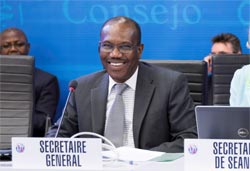
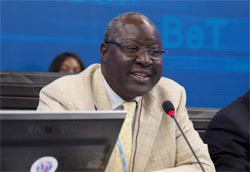
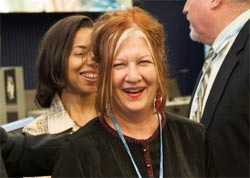




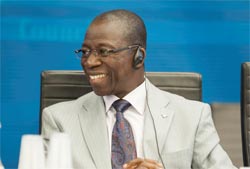
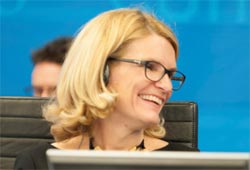

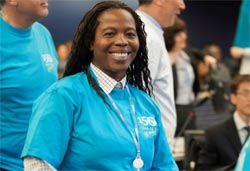
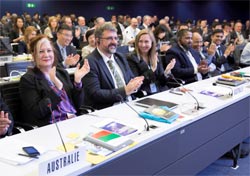


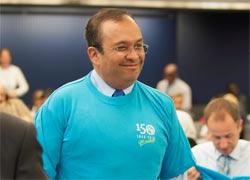
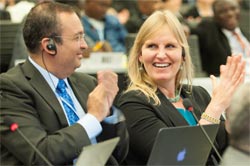
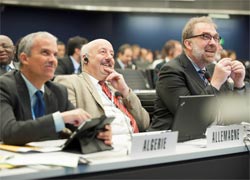

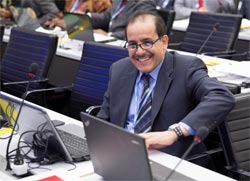
|
